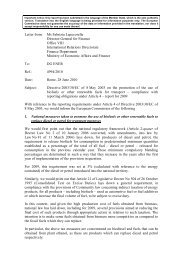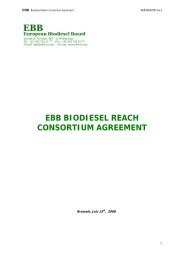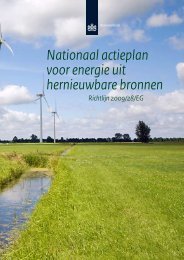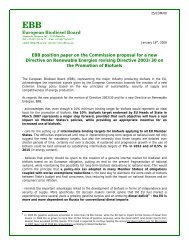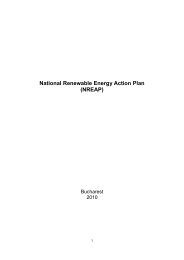EBB - European Biodiesel Board
EBB - European Biodiesel Board
EBB - European Biodiesel Board
You also want an ePaper? Increase the reach of your titles
YUMPU automatically turns print PDFs into web optimized ePapers that Google loves.
445/PRO/07 <strong>EBB</strong> REPLY to public consultation of DG TREN, April-May 2007<br />
1. HOW SHOULD A BIOFUELS SUSTAINABILITY SYSTEM BE DESIGNED?<br />
It would not be consistent to produce biofuels and generate very negative consequences on the<br />
environment as a result of their production. <strong>Biodiesel</strong> is an environmental product and we have to avoid<br />
the possibility that its production may lead to serious environmental damages.<br />
For this reason the <strong>European</strong> biodiesel industry will stand first in order to apply a<br />
certification scheme aimed at avoiding such consequences.<br />
As indicated above such system should be conceived in a way as to further promote the production and<br />
the use of biofuels in Europe via eliminating all doubts on eventual negative environmental impacts.<br />
The environmental sustainability of the agricultural or forestry raw materials with which biofuels are or<br />
will be produced is clearly a fundamental aspect of their future development. Obviously the issue needs<br />
to be tackled in an appropriate perspective underlining the efforts that the EU has realised (crosscompliance,<br />
agri-environmental measures) in the last years towards a more sustainable agriculture. Such<br />
efforts are unique at world-wide level and have to be taken into account while assessing the<br />
environmental sustainability of biofuels and biofuels raw materials originated from the EU or from third<br />
countries. This distinction is quite fundamental specifically in the case of biodiesel since it is worth<br />
mentioning that more than 90% of the biodiesel produced in Europe today is originated from EU raw<br />
materials and that such a situation is expected to be modified only but marginally within the next 5 years,<br />
EU biodiesel raw materials being expected to cover at least 70 to 80% of the biodiesel industry demand<br />
of supply even in the long term and under the 2020 targets.<br />
For EU produced raw materials <strong>EBB</strong> considers that the current cross-compliance rules (on the negative<br />
side) and (on the positive side) the agri-environmental measures of the CAP applying to food and nonfood<br />
productions have to be considered as sufficient and there would be no necessity to strengthen<br />
them.<br />
As far as imported raw materials (or imported finished products) are concerned, <strong>EBB</strong> favours the<br />
establishment of an eventual certification system aiming to avoid the non-sustainable use of limited<br />
natural resources (notably of the rain forest) provided that such a system is:<br />
- simple and proportional<br />
- horizontal and non-discriminatory<br />
- internationally applicable<br />
Simple and proportional<br />
It would not be consistent to damage the environment while producing biofuels. It would be inconsistent<br />
as well if the consequence of a sustainability scheme would be to create a burdensome and costly system<br />
that would discourage the use, the production and the competitiveness of biofuels (which are part of the<br />
solution), when compared to fossil fuels (which are part of the problem).<br />
To this end a certification scheme should be conceived in the simplest possible way. Default values<br />
should be used in order to simplify the calculations of the GHG balances. The principle of proportionality<br />
should apply to such a system: contrary to food products which are sold in little packages in the shelves<br />
of a supermarket, biofuels are produced and distributed in bulk blended together with millions of tonnes<br />
of fossil fuels every year. It would not be proportional to conceive a system were biofuels raw material or<br />
their production processes are monitored or worse traced or labelled at each step.<br />
Horizontal and non-discriminatory<br />
It would be misleading to believe that a certification scheme applied to biofuels alone would solve or<br />
even just contribute to solve the problem of deforestation and biodiversity loss. As far as biodiesel is<br />
concerned it needs to be underlined that palm oil for EU biodiesel production accounted for less than 5%<br />
of the overall EU palm oil imports last year. The “remaining” 95% was used for food production (∼75%)<br />
and electricity generation (∼20%). It also needs to be reminded that palm oil imports in the EU have<br />
- 3 -



